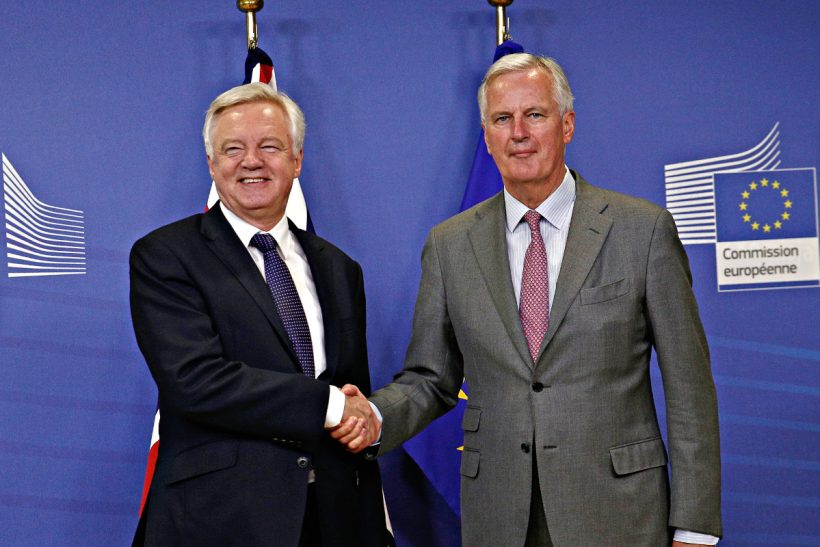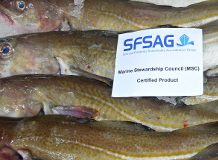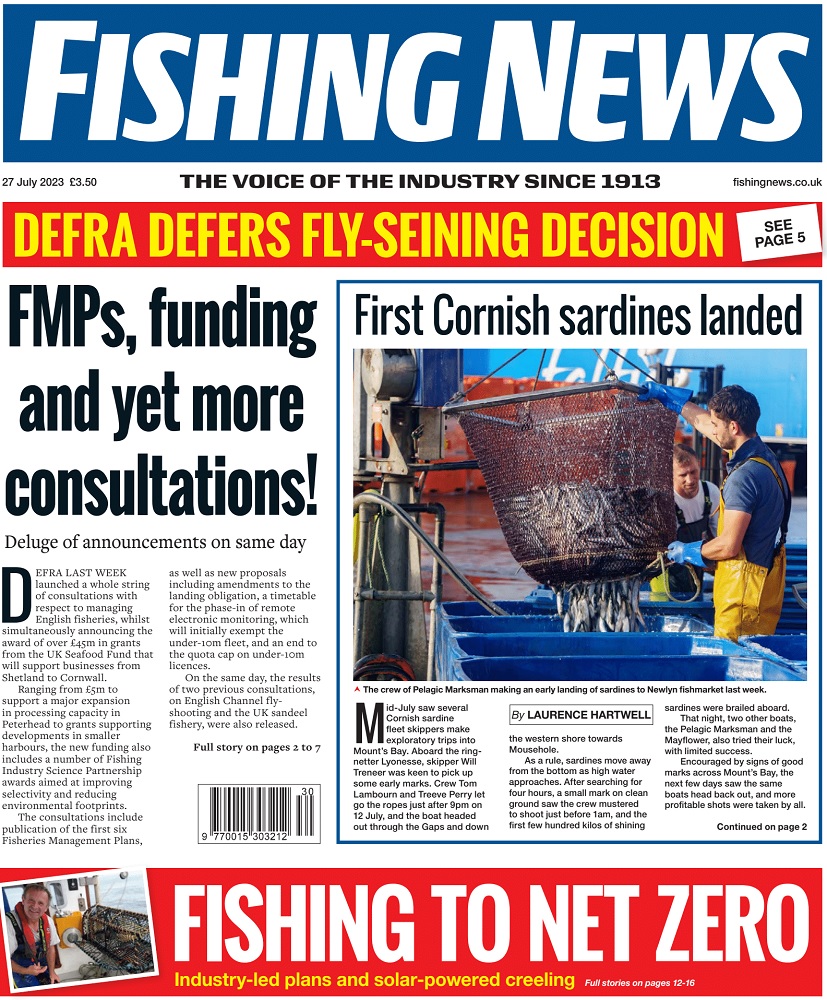Government blasted as industry locked into CFP for three more years
A torrent of outrage, anger and disappointment spilled out from across the UK industry last week after the announcement of the Brexit transition deal that will lock the UK fishing industry into the CFP with no change for another 20 months after Brexit, reports Tim Oliver.
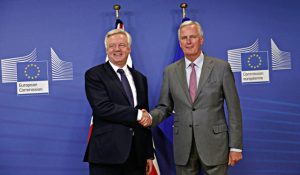
UK and EU chief negotiators David Davis and Michel Barnier shake hands after agreeing the text of the draft legal agreement on the Brexit transition period that will end on 31 December 2020 (Photo: Alexandros Michailidis/Shutterstock.com)
Fishermen and their leaders from throughout the UK accused the government of caving in to EU demands for ‘no change’ despite the UK becoming an independent coastal state after 29 March, 2019.
The deal means the entire existing CFP regulations will remain in force for UK fishermen at least until the end of 2020. The UK government will have no official voice in setting TACs and quotas or other regulations, but may be ‘consulted’ and have the opportunity to ‘provide comments to the Commission’.
Hard-line Tory Brexiteers met the prime minister to express their anger, and MPs and MSPs representing coastal constituencies throughout the country slammed the deal.
Fishing for Leave organised a ‘flash’ demonstration, with a Thames fishing vessel sailing up the river to the Houses of Parliament. Former UKIP leader, Nigel Farage, was on board accompanied by mainstream media and TV reporters who filmed him dumping fish to highlight the industry’s problems and the dangers the landing obligation will bring (see page 3).
The government was warned it will suffer at the ballot box as a result of the deal.
NFFO: ‘Capitulation’
NFFO chief executive Barrie Deas said the danger with agreeing to the EU’s terms was the UK would be a coastal state in name only. He said the prime minister had told them the UK would renegotiate the conditions of quotas and access but said: “That promise is on hold now, and may never materialise.”
“This is being presented as a tactical concession that will not prejudice our longer-term aims. But it has all the hallmarks of a capitulation,” said the federation chief.
“There is danger in making concessions as part of transitional arrangements because similar pressures will apply when it comes to negotiations, later this year, on the UK’s long-term relationship with the EU. The EU, not unnaturally, will want to maintain the asymmetric and exploitative relationship that currently exists.”
He added that sticking to existing quota shares during the transition period will cause ‘serious difficulties’ when the EU landing obligation comes fully into force on 1 January, 2019.
SFF: ‘We do not trust them’
Bertie Armstrong, chief executive of the SFF, said the deal was ‘far short of acceptable’ and called for a ‘written, cast-iron guarantee’ of genuine sovereignty after the implementation period.
He said: “We will leave the EU and leave the CFP, but hand back sovereignty over our seas a few seconds later. Our fishing communities’ fortunes will still be subject to the whim and largesse of the EU for another two years.
“Put simply, we do not trust them to look after us. So we issue this warning to the EU: be careful what you do, or the consequences later will be severe. To our politicians, we say this: some have tried to secure a better deal, but our governments have let us down.
“As a consequence, we expect a written, cast-iron guarantee that after the implementation period, sovereignty will mean sovereignty and we will not enter into any deal that gives any other nation, or the EU, continued rights of access or quota, other than those negotiated as part of the annual coastal states negotiations.”
NUTFA: ‘Inept and spineless’
Dave Cuthbert of the New Under Ten Fishermen’s Association (NUTFA) said: “We are all bitterly disappointed that we have once again been betrayed by an inept and spineless government that has capitulated to the EU at the first hurdle.”
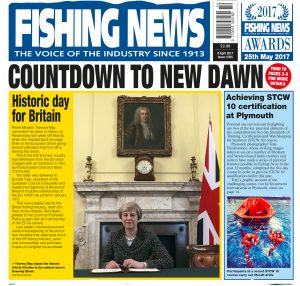
The front cover of Fishing News 6 April 2017 gave prominence to PM Theresa May signing the historic Article 50 letter notifying the European Union of Britain’s withdrawal from the EU which fishermen believed would free them from the hated CFP. Two totally contrasting headlines separated by less than 12 months are a stark reminder of how quickly things can change in politics.
He said NUTFA, NFFO, UKAFPO and the SFF had been working on an external experts group for the last year and had been ‘unanimous’ in their Brexit views, despite their different views on domestic fisheries policy and internal quota shares.
He said: “We had endless discussions about day-one readiness, and were always assured that from 1 April, 2019, we would no longer be subject to the CFP, would be able to control access to our waters to 200 miles, and would be able to set our own autonomous quotas.
“There is no doubt that many coastal MPs will feel the backlash of this decision at the next election, including the home secretary, whose Hastings constituency will be one of those most affected.
“The quite pathetic statement from Michael Gove does nothing to reassure fishermen that December 2020 will be anything other than bad news for fishermen, as the surrender of our waters – and ultimately our future – will be complete.”
SFA: ‘Extremely harmful’
Simon Collins, chief executive of Shetland Fishermen’s Association, slammed the deal as ‘extremely harmful’ in two respects.
“Firstly, it takes us backwards from where we are now, by depriving the UK of influence in every major aspect of fisheries, in effect for two years. Instead of gaining sovereignty over our waters, we are actually ceding most of what little control we have at present.
“Secondly, the failure of our negotiators to stand up for the fishing industry’s interests has destroyed our trust in our own government. The case for fisheries to be treated differently during the transition period was both unique and strong, but it has been squandered without a fight.”
Mike Park, chief executive of the Scottish White Fish Producers’ Association, said it was the ‘first indication of what the Tory government really thinks about the fishing industry’.
The draft deal was due to be ratified at an EU summit at the end of last week. The longer-term arrangements are due to be settled in outline by October this year, to give time for the remaining 27 member states to agree it before the 29 March 2019 withdrawal date.
Gove: ‘Significant prize’ after transition
Top fisheries minister Michael Gove told MPs there were ‘important legal and technical questions’ relating to fisheries management, which gave it ‘a special position’ in the negotiations.
Making a statement in the Commons on the transition deal, he said: “Both the EU and our own negotiators were always clear that specific arrangements would have to be agreed for fisheries. Our proposal to the EU (after full consultation with the industry) was that during the implementation period we would sit alongside other coastal states as a third party and equal party in annual quota negotiations.
“We pressed hard during negotiations to secure this outcome, and we are disappointed that the EU was not willing to move on this.”
He said the UK’s quota shares would not change during the implementation period and the UK would be able to attend international negotiations. “The agreement includes an obligation on both sides to act in good faith during the implementation period. Any attempt by the EU to operate in a way that would harm the fishing industry, would breach that obligation.”
These arrangements will only apply to negotiations in 2019, and ‘critically, in December 2020, we will be negotiating fishing opportunities as a third country and independent coastal state, deciding who can access our waters and on what terms’.

“May’s taking the papa, india, sierra, sierra and Gove doesn’t give a pollock.”
Mr Gove said it would be important to use the transition period to ensure that we can negotiate as a third country and independent coastal state in 2020, ‘for the first time in 40 years’.
“There is a significant prize at the end of the implementation period, and it is important that all of us, in every area, accept the implementation period is a necessary step towards securing that prize.”
Prime minister Theresa May said the government would be working with both fishermen and fish processors to ensure there was ‘a bright future’ for the fishing industry.
She told MPs: “I want to see three things:
● we will take back control of our waters
● we will ensure that we do not see British fishermen unfairly denied access to other waters
● we want to rebuild our fishing industry.
“The implementation period is there so that people have the certainty of being able to operate on the same basis, until we reach the new partnership that we are negotiating.
“It has been agreed that the (relative) stability key will not be changed, so the quotas that British fishermen will be operating under will not be changed. I know that DEFRA is looking actively at how we can ensure that we not only maintain our fishing industry, but enhance and rebuild it after we leave.”



